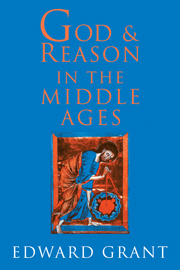Book contents
- Frontmatter
- Contents
- Acknowledgments
- Introduction
- 1 The Emergence of a Transformed Europe in the Twelfth Century
- 2 Reason Asserts Itself: The Challenge to Authority in the Early Middle Ages to 1200
- 3 Reason Takes Hold: Aristotle and the Mediveal University
- 4 Reason in Action: Logic in the Faculty of Arts
- 5 Reason in Action: Natural Philosophy in the Faculty of Arts
- 6 Reason in Action: Theology in the Faculty of Theology
- 7 The Assault on the Middle Ages
- Conclusion: The Culture and Spirit of “Poking Around”
- Bibliography
- Index
2 - Reason Asserts Itself: The Challenge to Authority in the Early Middle Ages to 1200
Published online by Cambridge University Press: 28 August 2009
- Frontmatter
- Contents
- Acknowledgments
- Introduction
- 1 The Emergence of a Transformed Europe in the Twelfth Century
- 2 Reason Asserts Itself: The Challenge to Authority in the Early Middle Ages to 1200
- 3 Reason Takes Hold: Aristotle and the Mediveal University
- 4 Reason in Action: Logic in the Faculty of Arts
- 5 Reason in Action: Natural Philosophy in the Faculty of Arts
- 6 Reason in Action: Theology in the Faculty of Theology
- 7 The Assault on the Middle Ages
- Conclusion: The Culture and Spirit of “Poking Around”
- Bibliography
- Index
Summary
KNOWLEDGE OF SCIENCE AND NATURAL PHILOSOPHY IN THE early Roman Empire was largely an inheritance from the ancient Greeks. Christian beliefs and ideas about the world that emerged during the first few centuries after Christ interacted with the dominant pagan view and helped shape a new outlook and a new worldview. If the wisdom of the world had previously been embedded in pagan learning, the triumph of Christianity in the late fourth century changed all that. The new wisdom emanated from Sacred Scripture, the Bible, and in the fundamental belief that an omniscient and omnipotent God had created our world from nothing, a conception that would have been utterly incomprehensible and unintelligible to traditional Greek philosophers. An important part of our story concerns the interrelationship between pagan and Christian learning. The eventual explicit and self-conscious use of reason as a force in medieval intellectual life emerged from this interrelationship, with results that were profound for the late Middle Ages and for the future of Western society.
CHRISTIANITY AND LATE ANTIQUITY
To understand what happened in the twelfth century, it is necessary to begin with the early Middle Ages, with its roots in the late Roman Empire. During that period in Western Europe, intellectual life was shaped by concerns about the Christian religion and its theology, and by a modest amount of secular learning that was largely an inheritance from pagan Greek sources, such as Plato, Aristotle, Cicero, and the Stoics.
- Type
- Chapter
- Information
- God and Reason in the Middle Ages , pp. 31 - 82Publisher: Cambridge University PressPrint publication year: 2001



